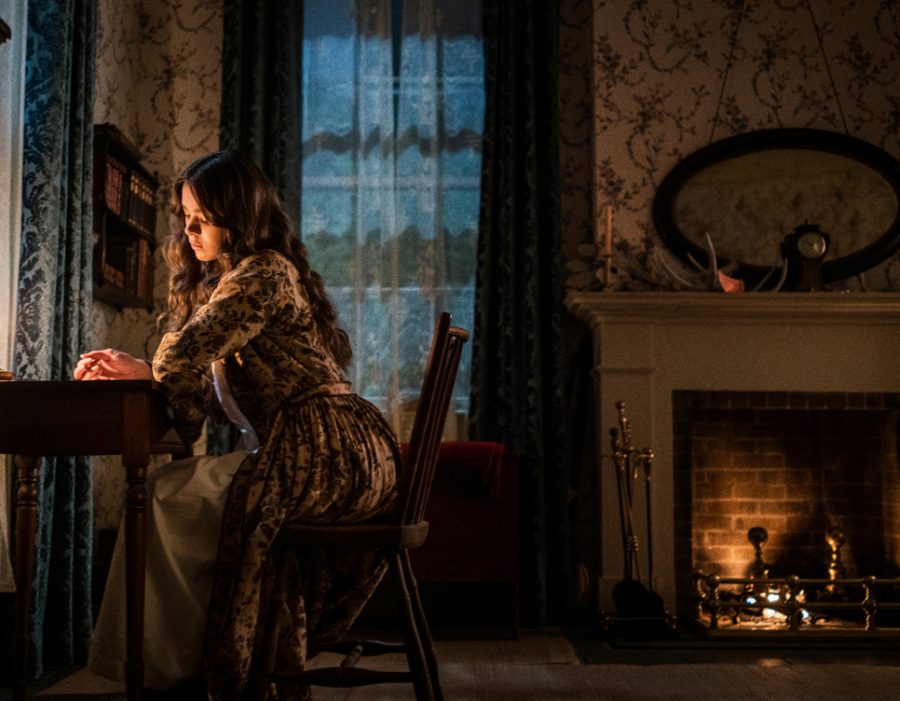‘Dickinson’ brings poet to life
Opinion Columnist Taylor Lien reviews “Dickinson” on AppleTV+. The series revolves around poet Emily Dickinson, played by Hailee Steinfeld. According to Lien, this portrayal gives life to the poet, who is historically seen as an “unmarried recluse.” “Dickinson received an 88 percent rating on Rotten Tomatoes at launch.
Nov 4, 2019
This past weekend, Apple debuted their streaming service AppleTV+. The black comedy “Dickinson,” based on the life of American poet Emily Dickinson, was one of the debut original series on the service. The press and marketing around this series definitely meant I was very excited to see it. As a digital media and English double major, this show is a perfect intersection of my interests. Emily Dickinson was brought to life in this show in a way that dissecting her poetry in a classroom never truly could.
Hailee Steinfeld stars as Emily Dickinson in her twenties and Jane Krakowski plays her mother who shares Emily’s name. Wiz Khalifa also plays a personified Death, since much of Dickinson’s poetry centers the theme.
Out of the ten episode first season, several episodes centered around some of her most famous poems. Throughout the series, her poems are brought to life on the screen. The historical aspects of the series are used with a lot of liberties. The music is current, and the scripts use modern slang.
It is easy to see why this is one of Apple’s highest rated original series on launch with a 88 percent on Rotten Tomatoes. Steinfeld gives a dynamic and convincing performance as Dickinson. She gives life to the poet in a way that is much more than the unmarried recluse narrative that we are often given in the front of our English textbooks.
Steinfeld also plays well alongside her onscreen siblings, Lavinia, played by Anna Baryshnikov, and Austin, played by Adrian Enscoe.
Dickinson is also portrayed as being in some sort of romantic relationship with her childhood best friend Sue Gilbert, played by Ella Hunt. The entire season centers around love and Dickinson’s relationship to the expectations of women during the 1850s. Throughout the season, Emily and Sue’s choices are held up in juxtaposition, not for the viewer to make value judgements about one or the others choices, but more to allow observations about how Emiliy’s privilege allowed her to make decisions that went against gender norms at the time.
The show is set in the months leading up to the start of the Civil War, and throughout the season we see glimpses of a nation divided and uneasy. Since the Dickinsons lived in Amherst, Massachusetts, we see more of an abolitionist perspective from many of the characters. Despite the fact that the characters are speaking about a war that was fought almost 200 years ago, many of the sentiments are applicable to current political situations.
It is impressive, the way that the dialogue speaks to our current day just as well as the 1850s. There is never a time where it feels forced or preachy. There is an invisible echo to situations our nation currently finds itself in, but it never feels as if the actors will turn to the camera and wink or mention the menace of social media.
Dickinson is a subversive period comedy that handles its subject matter with care and grace and gives dimension to history in ways that are hard to imagine. The modern music and feminist bent given to this show makes it a standout amonst all of the other choices available on streaming platforms. It does something so many other shows try and often don’t succeed at. It asks questions without giving easy answers.
Even with the overcrowded market of streaming services, give AppleTV+ a try, even just for a week or so, to experience the charming magic of “Dickinson.”








